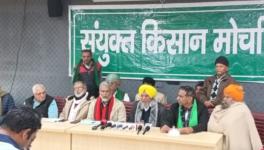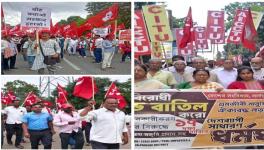TN: SAP Must be Restored to Save Deteriorating Sugarcane Farming and Industry
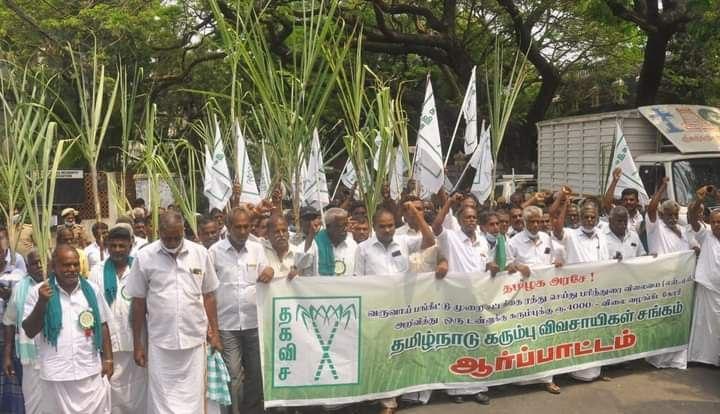
Tamil Nadu Sugarcane Farmers Association taking a march towards the government secretariat demanding Rs 4000 per tonne, as promised by the DMK during the assembly election.
The miseries of sugarcane farmers in Tamil Nadu seem to never end. The farmers are craving the attention of the government towards the industry, which remains in stagnation for almost a decade.
The decision of the previous government to abolish the State Advisory Price (SAP) for cane and a paltry increase in the Fair and Remunerative Price (FRP) by the Union government has left the farmers in distress, together with the delay in payment from the private sugar mills forcing them into debt.
The delay in implementing the MS Swaminathan Commission report by the Union government, lack of will in improving the facilities in state-run sugar mills continues to pull back one of the most important cash crops in Tamil Nadu.
The lack of new varieties with a recovery rate of 10% continues to elude the farmers in Tamil Nadu, depriving them of the FRP and incentive. The much-praised agriculture budget has also failed to meet the expectations of the cane farmers, forcing them to hold protests demanding restoration of SAP and timely disbursal of dues.
REASONS BEHIND DOWNFALL OF THE INDUSTRY
Sugarcane is grown in most of the districts in Tamil Nadu in an area of more than 1.5 lakh hectares (ha) with an annual production of 161 lakh metric tonnes (MT). The state is ranked number one in productivity (tonnes/ha), though ranked lower in quantity of production.
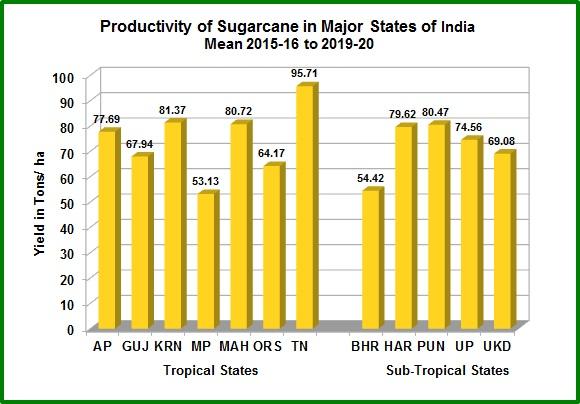
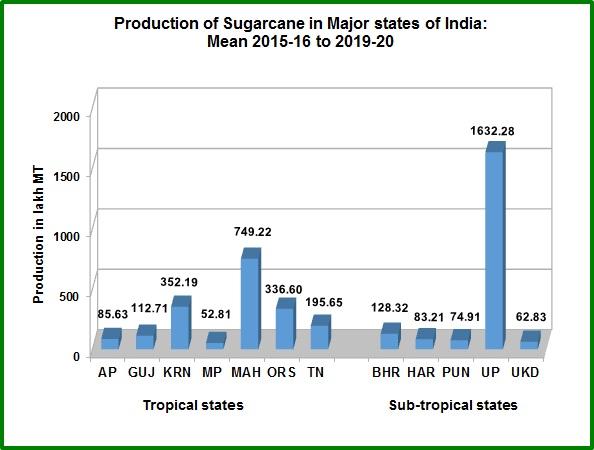
Courtesy: https://sugarcane.icar.gov.in
“The FRP announced by the union government is applicable to sugarcane with a recovery rate of 10%. In Tamil Nadu, the rate varies from 8.8% to 9.5%. So the farmers do not get the FRP, but a lower amount. More research-related activities are required to improve this so that the income of the farmers are not reduced,” D Raveendran, general secretary of Tamil Nadu Sugarcane Farmers Association said.
The policy note of the department of agriculture and farmers welfare of the government of Tamil Nadu has also conceded that steps are necessary to improve the recovery rate while accepting that the production and productivity has declined due to an increase in the cost of cultivation, static sugar price, mounting cane payment arrears and non-availability of alternate high yielding sugarcane varieties
The association also points out two major issues for the stagnation of the sugarcane industry, which needs urgent attention from the State government.
“The private and cooperative sugar mills refused to pay the SAP for 4 continuous years from 2013-14. The farmers received only the FRP during this period. The state government has failed to ensure that the farmers are paid what is due to them,” Raveendran said.
In addition to this non-payment of SAP, the mills delay the FRP payable to the farmers for months together. The mills must pay the farmers within 15 days from the date of procurement of cane from farmers as per the Sugar (Control) Order, 1966.
“This order is not being followed. The order also adds that the mills must pay 15% interest for each day of delay. The government and the concerned departments are not worried about the delay and the problems faced by the farmers,” Raveendran accused.
ABOLITION OF SAP - A MAJOR SETBACK
In a drastic policy change, the previous regime in the state of the All India Anna Dravida Munnetra Kazhagam (AIADMK) abolished the SAP and shifted to the revenue sharing formula (RSF) for sugarcane in 2018.
The All India Kisan Sabha (AIKS) to which the sugarcane farmers association is affiliated had called for the abolition of RSF and restoration of SAP, which continues to be implemented in several states including Uttar Pradesh, Uttarakhand, Haryana and Punjab.
The previous AIADMK regime was criticised for implementing the pro-corporate RSF and passing a contract farming law, thus becoming the first state government to do so, which several BJP led governments did not do.
The AIKS has welcomed the decision of the Dravida Munnetra Kazhagam (DMK) government to provide transitional production incentives and special incentives to the sugarcane farmers. But, the association has reiterated restoring the SAP.
In addition to the FRP of Rs 2,900 per tonne announced by the union government, several states continue to pay SAP.
“The Uttar Pradesh government is providing an SAP of Rs 600 while Punjab and Haryana pay Rs 720 and Rs 700 respectively. Why Tamil Nadu abolished this remains a misery. We demand the DMK government to reintroduce the SAP and abolish RSF in the demand for grants which will be presented in the4 assembly within a week,” Raveendran said.
It has to be noted that the DMK had supported the historic farmers' struggle and passed a resolution against the three farm laws in the assembly after assuming power in May 2021.
“If the government is really concerned about the plights of the farmers, certain policy decisions are mandatory. The DMK had supported the demand of the Samyukta Kisan Morcha (SKM) on MSP as well. The government must consult with the stakeholders before deciding on policy matters,” Raveendran said.
‘CONTROL THE SUGAR MILLS’
Another major problem faced by the sugarcane farmers is the attitude of the private sugar mills in the state. From delaying the payment to the farmers to allegations of taking loans in the name of farmers without their knowledge, the mills go scot-free on many occasions.
“Most of the sugar mills earn a profit, but many claim to be in distress. The mills can expedite options to manufacture ethanol. The union government has set a target for ethanol production, which can be followed by the mills as well,” Raveendran said.
Along with the farmers, the workers in the mills also face issues with getting wages in time. The workers have also alleged neglect from the state government in addressing the issues.
The cost of production, equipment and cutting charges have increased in recent years which has not been addressed sufficiently, claims the association.
“The government must talk to the farmers and mills on deciding on the mechanism of timely payment, methodologies on cutting and transporting cane from the fields to the mills. Cutting charges per year should be fixed to avoid disputes,” AIKS has demanded repeatedly.
The cooperative and public sector sugar mills remain highly neglected for years, leading to losses. The machinery has not been replaced for more than 4 decades. “The state government must get the funds from the Sugarcane Development Board through the Union government to develop the cooperative and public sector mills,” Raveendran said.
Get the latest reports & analysis with people's perspective on Protests, movements & deep analytical videos, discussions of the current affairs in your Telegram app. Subscribe to NewsClick's Telegram channel & get Real-Time updates on stories, as they get published on our website.













